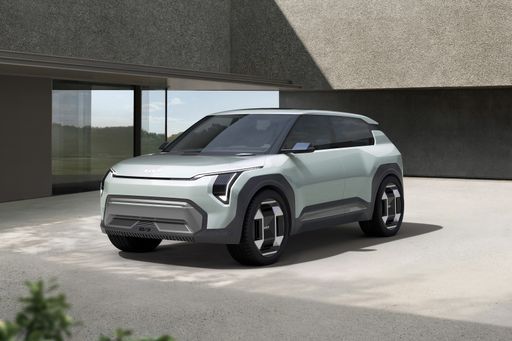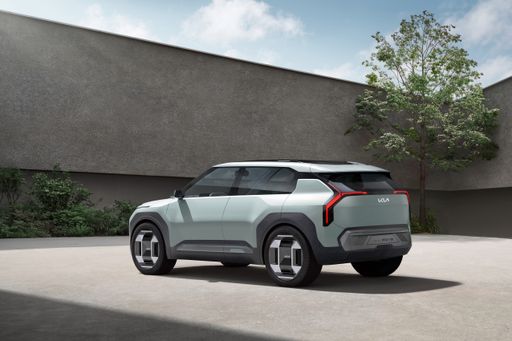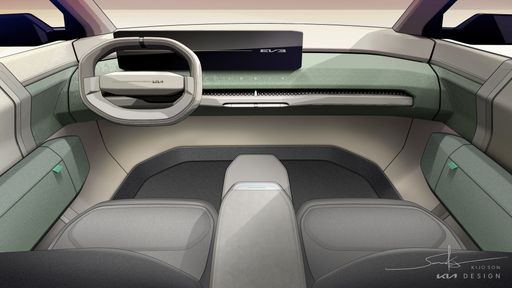Kia EV3 vs Toyota Yaris Cross - Differences and prices compared
Compare performance (204 HP vs 130 HP), boot space and price (30800 £ vs 23700 £ ) at a glance. Find out which car is the better choice for you – Kia EV3 or Toyota Yaris Cross?
Costs and Efficiency:
Price and efficiency are often the first things buyers look at. Here it becomes clear which model has the long-term edge – whether at the pump, the plug, or in purchase price.
Toyota Yaris Cross has a distinct advantage in terms of price – it starts at 23700 £ , while the Kia EV3 costs 30800 £ . That’s a price difference of around 7157 £.
Engine and Performance:
Under the bonnet, it becomes clear which model is tuned for sportiness and which one takes the lead when you hit the accelerator.
When it comes to engine power, the Kia EV3 has a noticeable edge – offering 204 HP compared to 130 HP. That’s roughly 74 HP more horsepower.
In acceleration from 0 to 100 km/h, the Kia EV3 is clearly quicker – completing the sprint in 7.50 s, while the Toyota Yaris Cross takes 10.70 s. That’s about 3.20 s faster.
There’s no difference in top speed – both reach 170 km/h.
Space and Everyday Use:
Cabin size, boot volume and payload all play a role in everyday practicality. Here, comfort and flexibility make the difference.
Both vehicles offer seating for 5 people.
In curb weight, Toyota Yaris Cross is significantly lighter – 1180 kg compared to 1800 kg. The difference is around 620 kg.
In terms of boot space, the Kia EV3 offers slightly more room – 460 L compared to 397 L. That’s a difference of about 63 L.
In maximum load capacity, the Kia EV3 performs to a small extent better – up to 1251 L, which is about 154 L more than the Toyota Yaris Cross.
When it comes to payload, Toyota Yaris Cross slight takes the win – 510 kg compared to 470 kg. That’s a difference of about 40 kg.
Who wins the race in the data check?
The Kia EV3 holds a decisive overall lead in the objective data comparison.
This result only shows which model scores more points on paper – not which of the two cars feels right for you.
Costs and Consumption
View detailed analysis
Engine and Performance
View detailed analysis
Dimensions and Body
View detailed analysis

Kia EV3
Kia EV3
The Kia EV3 arrives as a cheeky, practical electric compact that manages to feel both premium and playful, delivering crisp handling and a roomy cabin that's perfect for urban life. With smart tech, friendly styling and sensible pricing, the EV3 is the kind of car that makes switching to electric feel like a no-brainer without asking you to give anything important up.
details


Toyota Yaris Cross
The Toyota Yaris Cross takes the jaunty personality of the Yaris and gives it a taller stance and a bit more practicality, so you get city-friendly agility with added SUV presence. It’s easy to live with, economical on the daily grind, and smartly packaged — a sensible pick for buyers who want fuss-free transport with a touch of character.
details






Costs and Consumption |
|
|---|---|
|
Price
30800 - 41700 £
|
Price
23700 - 34300 £
|
|
Consumption L/100km
-
|
Consumption L/100km
4.5 - 4.8 L
|
|
Consumption kWh/100km
14.9 - 16.2 kWh
|
Consumption kWh/100km
-
|
|
Electric Range
436 - 605 km
|
Electric Range
-
|
|
Battery Capacity
58.3 - 81.4 kWh
|
Battery Capacity
-
|
|
co2
0 g/km
|
co2
101 - 108 g/km
|
|
Fuel tank capacity
-
|
Fuel tank capacity
36 L
|
Dimensions and Body |
|
|---|---|
|
Body Type
SUV
|
Body Type
SUV
|
|
Seats
5
|
Seats
5
|
|
Doors
5
|
Doors
5
|
|
Curb weight
1800 - 1885 kg
|
Curb weight
1180 - 1290 kg
|
|
Trunk capacity
460 L
|
Trunk capacity
320 - 397 L
|
|
Length
4300 - 4310 mm
|
Length
4180 mm
|
|
Width
1850 mm
|
Width
1765 mm
|
|
Height
1560 - 1570 mm
|
Height
1595 mm
|
|
Max trunk capacity
1251 L
|
Max trunk capacity
1097 L
|
|
Payload
470 kg
|
Payload
485 - 510 kg
|
Engine and Performance |
|
|---|---|
|
Engine Type
Electric
|
Engine Type
Full Hybrid
|
|
Transmission
Automatic
|
Transmission
Automatic
|
|
Transmission Detail
Reduction Gearbox
|
Transmission Detail
CVT
|
|
Drive Type
Front-Wheel Drive
|
Drive Type
Front-Wheel Drive, All-Wheel Drive
|
|
Power HP
204 HP
|
Power HP
116 - 130 HP
|
|
Acceleration 0-100km/h
7.5 - 7.9 s
|
Acceleration 0-100km/h
10.7 - 11.3 s
|
|
Max Speed
170 km/h
|
Max Speed
170 km/h
|
|
Torque
283 Nm
|
Torque
-
|
|
Number of Cylinders
-
|
Number of Cylinders
3
|
|
Power kW
150 kW
|
Power kW
85 - 96 kW
|
|
Engine capacity
-
|
Engine capacity
1490 cm3
|
General |
|
|---|---|
|
Model Year
2024
|
Model Year
2024 - 2025
|
|
CO2 Efficiency Class
A
|
CO2 Efficiency Class
C
|
|
Brand
Kia
|
Brand
Toyota
|
What drive types are available for the Kia EV3?
The Kia EV3 is offered with Front-Wheel Drive.




